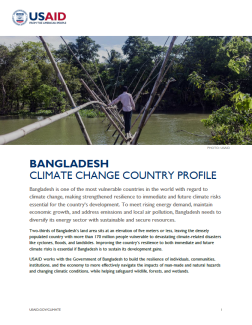To meet rising energy demand, maintain economic growth, and address emissions and local air pollution, Bangladesh needs to diversify its energy sector with sustainable and secure resources. Improved resilience to immediate and future climate risks is essential to the country’s development.
Two-thirds of Bangladesh’s land area sits at an elevation of five meters or less, leaving the densely populated country with more than 170 million people vulnerable to devastating climate-related disasters like cyclones, floods, and landslides. Improving the country’s resilience to both immediate and future climate risks is essential if Bangladesh is to sustain its development gains.
USAID works with the Government of Bangladesh to build the resilience of individuals, communities, institutions, and the economy to more effectively navigate the impacts of man-made and natural hazards and changing climatic conditions, while helping safeguard wildlife, forests, and wetlands.
Bangladesh Climate Priorities
Bangladesh has made impressive strides in creating a climate-action policy framework. This framework integrates climate change considerations across various sectors, emphasizing the interconnectedness of climate adaptation and mitigation with social, economic, and environmental dimensions. The domestic framework not only aligns with key international commitments, such as the Paris Agreement, which Bangladesh ratified in September 2016, but also establishes a clear direction for policy development and implementation.
Bangladesh has long been an active participant in the United Nations Framework Convention on Climate Change (UNFCCC) process and in 2005 became the first country to produce a National Adaptation Programme of Action. Bangladesh also submitted an updated Nationally Determined Contribution (NDC) in 2021 and adopted a National Adaptation Plan 2023-2050 the following year.
USAID’S Climate Change Program: Objectives and Results
USAID supports Bangladesh’s development and climate priorities through a series of programs and partnerships addressing climate mitigation and adaptation. USAID strengthens climate resilience, improves natural resources governance and sustainable energy uses, and advances green economic growth within the country. USAID also strategically engages with the private sector to support innovation and maximize impact.
Adaptation
USAID supports local communities, government, and civil society organizations with activities to build resilience, including co-management of forests and wetland areas. USAID activities provide an integrated package of services to the poor and extreme poor and facilitate engagement across a wide range of areas, including: agriculture; livelihoods; health; nutrition; water, sanitation, and hygiene services (WASH); inclusive small business development; microfinance; women’s empowerment; and social accountability.
USAID supports disaster risk reduction activities by building institutional capacity, coordination, and infrastructure in order to prepare for, respond to, and reduce risks related to natural disasters like cyclones, flooding, and other environmental shocks. USAID also trains and prepares communities in vulnerable areas to mitigate and recover from the effects of disasters, and has helped construct cyclone shelters and establish early warning systems. Additionally, USAID promotes better use of climate information and analysis in decision-making processes to improve local governments’ responsiveness to constituent needs.
USAID-supported Feed the Future activities promote climate-smart agricultural approaches to help farmers and producers adapt to changes in growing conditions and train farmers to adopt cultivation practices that reduce the intensity of greenhouse gas emissions from the agriculture sector. As the weather becomes more volatile, USAID investments are helping reduce farmers’ exposure to climate risks with machinery that speeds up the planting and harvesting processes. Investments in research for more resilient varieties of rice and other crops are enabling smallholder farm households to withstand climate-related shocks such as drought, saltwater intrusion, or increased prevalence of pests. Communities also benefit from new road and market infrastructure designed to withstand the increased rainfall intensity that climate change is bringing to Bangladesh.
Renewable Energy
USAID helps to not only strengthen the country’s policy and regulatory environment so that it is more conducive to increased investment in the sustainable energy sector, but also to scale up the adoption of energy-efficient technologies and clean and renewable energy resources. USAID works to strengthen energy institutions to expand electricity access, modernize power utilities, enhance planning, and improve overall sector quality. Private sector engagement in pursuit of these objectives is fostered through collaboration with developers, banks, and energy companies, which facilitates piloting new technologies and connecting local developers with international experts.
In a regional context, USAID promotes cross-border clean energy trade to enhance security, generate revenue, and foster economic growth. Collaborating with the Government of Bangladesh, USAID is helping develop a strategy for large-scale, low-cost electricity which reinforces transmission and operational capacity. Overall, these initiatives align with USAID’s commitment to a sustainable, economically resilient future for Bangladesh.
Natural Climate Solutions
Severe degradation of natural resources, deforestation, and biodiversity loss all pose serious threats to both livelihoods and public safety across Bangladesh. USAID trains people to measure, analyze, monitor, and enforce forest resources protection, conserve carbon pools in soils and vegetation, and enhance carbon uptake in terrestrial reservoirs. USAID also provides technical assistance in support of Bangladesh’s Reducing Emissions from Deforestation and Forest Degradation (REDD+) objectives, while empowering local community co-management groups to monitor protected areas to conserve flora and fauna and reduce natural resource degradation.
Key Results
USAID has helped:
- Rehabilitate and construct more than 900 disaster shelters since 2001 that provide safe havens for 700,000 people during emergencies
- Work with the private sector to promote more fuel-efficient farm equipment, quality feed for livestock, use of crops and inoculants to fix atmospheric nitrogen, and biodigesters for waste management—all practices that mitigate greenhouse gas emissions
- Support the Government of Bangladesh’s development of the Energy Audit Manual, which offers comprehensive guidance for public energy regulators to increase the efficiency of thermal power plants to help the Government of Bangladesh identify energy inefficiencies, optimize operational processes, and enhance overall performance in the thermal power sector and reduce the country’s reliance on fossil fuels
- Protect Bangladesh’s natural resources and biodiversity during the past 20 years by bringing together local communities and local government authorities to co-manage more than one million hectares—or nearly 2.5 million acres—of wetlands and forest areas
- Contribute to an estimated 4 million metric tons of CO2 equivalent in greenhouse gasses reduced, sequestered, or avoided between FY 2009 and FY 2023
For More Information





